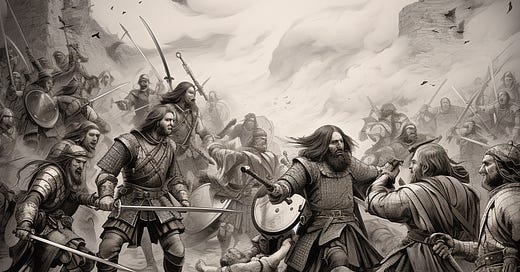5000 Menzies at Bannockburn: A Legacy Carved in Battle
The Battle of Bannockburn, fought on June 23 and 24, 1314, stands as a defining moment in Scottish history, symbolizing the struggle for independence against English rule. Among the numerous Scottish clans that played a crucial role in this historic battle, the Menzies clan's contribution is particularly noteworthy, not only for their numbers but also for the remarkable transition from their typically peaceful disposition to fierce warriors on the battlefield.
The Menzies Clan: Ancestral Roots and Historical Significance
The Menzies, hailing from the rugged landscapes of the Scottish Highlands in Perthshire, trace their origins back to the ancient times of King Fergus, the first King of Scots. This lineage instilled in them a deep sense of duty towards their land and its people. Historically known as a clan of scholars, diplomats, and peace-lovers, the Menzies were more inclined towards intellectual pursuits and maintaining harmony within their territories. Their Gaelic roots were reflected in their name, often spelled in various forms over the centuries, symbolizing their rich heritage and cultural significance in Scottish history.
The Stirring of the Clan: Menzies Rise to the Call
As King Edward II of England led a formidable force northwards, intent on subjugating the Scots, Robert the Bruce called upon the Scottish clans for a united stand against the English aggression. The response from the Menzies clan was not only swift but also unexpectedly robust. Breaking from their traditional roles, the Menzies rallied a force that legend claims numbered around 5,000 men - a remarkable figure given the overall size of Bruce's army of approximately 10,000. This massive turnout from a single clan was indicative of their commitment to Scotland's sovereignty and freedom.
The Role of Menzies in the Battle
On the battleground, the Menzies' presence was more than just a numerical addition. Their strategic acumen, honed through generations of diplomatic and scholarly endeavors, proved invaluable. The clan, under their distinctive red and white banner, took strategic positions, effectively flanking the English forces and contributing significantly to the Scottish tactical advantage. Despite their non-warrior background, the Menzies fought with a valor and determination that matched and, in some instances, surpassed that of seasoned soldiers. Their participation was a critical factor in the Scots' victory, showcasing their adaptability and martial prowess.
The Aftermath: Shaping the Clan’s Identity
The resounding victory at Bannockburn was a turning point in the First War of Scottish Independence. For the Menzies, it marked a transformation in their identity and perception. Post-Bannockburn, while they returned to their peaceful ways, their reputation was forever altered. They were no longer seen just as scholars and diplomats but also as valiant defenders of their nation. This newfound military reputation added a complex and rich layer to the clan's character, celebrated in Scottish history and lore.
The Menzies' legacy from Bannockburn also had a lasting impact on the clan's future generations. It instilled a sense of pride and a tradition of bravery that would be echoed in the clan's future endeavors, both on and off the battlefield. The Menzies continued to play significant roles in the shaping of Scotland, balancing their intellectual heritage with the legacy of their martial prowess demonstrated at Bannockburn.
Conclusion: The Menzies' Enduring Legacy
The story of the Menzies at Bannockburn is more than a historical account; it's a narrative of transformation, courage, and unwavering commitment to a cause. It serves as a testament to the indomitable Scottish spirit, where a clan known for its peaceful pursuits rose magnificently to the call of battle. The Menzies, through their significant contribution to one of Scotland's most iconic battles, carved out a unique and revered place in the annals of Scottish history. Their legacy continues to be celebrated, a reminder of their courage, adaptability, and profound commitment to Scotland's freedom and independence.





